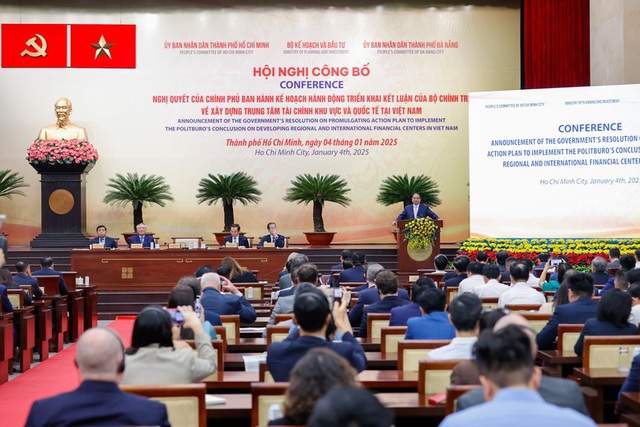Viet Nam has full conditions to establish international financial centers: Prime Minister
VGP - Viet Nam has full essential factors and conditions needed to develop a modern financial market, and to establish an international financial center in Ho Chi Minh City and a regional financial center in the central city of Da Nang.

Prime Minister Pham Minh Chinh (standing) delivers his remarks at the conference, Ho Chi Minh City, January 4, 2025 - Photo; VGP
Prime Minister Pham Minh Chinh made the above statement while chairing a conference on announcement of the Government's Resolution on promulgating an action plan to implement the Politburo's conclusion on developing regional and international financial centers in Viet Nam that took place in Ho Chi Minh City on Saturday.
Firstly, Viet Nam's GDP size in 2024 is estimated at US$470 billion, ranking 33rd-34th in the world and the GDP per capita is about US$4,600-4,700, the Prime Minister explained.
Building on strong growth momentum over the past years, Viet Nam aims for a GDP growth of at least 8 percent in 2025 and strives to achieve a double-digit growth rate in the coming years.
Secondly, strategic breakthroughs are achieving very positive results with a transparent institutional framework, seamless infrastructure, and intelligent governance.
Thirdly, the stock market capitalization has reached nearly VND7.2 trillion (over US$283 billion) this year, an increase of 21.2 percent compared to the end of 2023. The stock market has become the fastest-growing market in the region.
Fourthly, Viet Nam has an integrated and open economy, having signed 17 Free Trade Agreements (FTAs) involving 65 leading economies in the world. The nation's total export and import value is projected to reach US$800 billion in 2024, about 1.7 times higher than the total GDP size.
Fifthly, Viet Nam has maintaned stable political stability, social order and safety, and a peaceful life with an environment of peace, cooperation, and development.
In addition, the country has a strategic position and an important geopolitical location, situated in one of the most dynamic and innovative regions in the world. It also has a time zone that differs from the 21 largest global financial centers, highlighted the Prime Minister.
The early development of regional and international financial centers would help Viet Nam enhance connectivity with the global financial market; attract foreign financial institutions, and create new resources; and leverage opportunities from the movement of international investment flows to speed up socio-economic development.
Meanwhile, Viet Nam's financial market will be developed more effectively in according with international standards; and new breakthroughs for development will be created, stressed Pham.
He called on domestic and international partners to continue working together with the Vietnamese Government in establishing regional and international financial centers, as well as call on investors to take part in the process of building financial centers in the country.
Five key tasks for building financial centers in Viet Nam:
(1) Developing modern financial infrastructure, and promoting the establishment of leading payment, custody, and financial transaction systems.
(2) Attracting international talents through incentive mechanisms, creating attractive living and working environment, luring top financial experts from around the world.
(3) Enhancing financial innovation, developing new financial instruments such as green finance, financial technology (fintech), and financial risk management.
(4) Boosting international integration, fostering collaboration with global financial institutions, and participating in international financial standards.
(5) Protecting financial security, enhancing supervision and risk management, and ensuring the stability of the financial system.
Earlier, the Politburo has greenlighted the establishment of an international financial center in Ho Chi Minh City and a regional financial center in Da Nang City.
In its conclusion, the Politburo has requested a phased, strategic approach to developing the financial centers, with clearly defined geographical boundaries and target sectors.
The Politburo has advocated the piloting of a model that will combine special policies designed to foster competitiveness while ensuring adequate risk management and regulatory oversight./.
